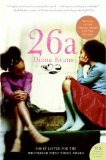Summary | Excerpt | Reading Guide | Reviews | Beyond the book | Read-Alikes | Genres & Themes | Author Bio

A Novel
by Monica AliIn the Kitchen is essentially a descent-into-madness tale, and we're warned of this in the novel's very first paragraph:
When he looked back, he felt that the death of the Ukrainian was the point at which things began to fall apart… it was the following day on which, if a life can be said to have a turning point, his own began to spin.
As the story unfolds, Gabriel Lightfoot's incipient breakdown reveals its roots: his mother's manic/depressive state, his mill town upbringing, his own desperate plans to make something of himself in the world of high class London restaurants, and the changing patterns of British society due to immigration and economics.
Though written in the third person, the point of view is all Gabriel's, who has contentious relationships with everyone in his life. He suffers from a debilitating inability to communicate, and is sorely out of touch with his kitchen crew, particularly with women. To top it off, he's self-absorbed, makes bad decisions, and acts inappropriately -
but his position as an Executive Chef excuses him; people expect him to be high-strung.
I can't say that Monica Ali has given us the easy read she created in Brick Lane. To spend over four hundred pages inside the mind of an unlikable man who is going down is unpleasant in the extreme, and there's not one other admirable character in this entire novel.
What is admirable is Monica Ali's writing. Some reviewers have complained of over-writing, awkward dialogue, and an imbalance between issues and story. On the contrary, Ali illuminates the detachment of modern day life through her characters, as well as the damage done by immigration policies and human trafficking. Every bit of dialogue demonstrates the missed human connections of her troubled characters, and the kitchen works as a perfect metaphor for the simmering tensions of life in twenty-first century London.
Being under so much stress, Gabriel has nightmares about the dead man found in the kitchen's catacombs, until he's barely able to sleep at all. As he begins his final descent, the writing becomes as surreal and insane as Gabriel's state of mind and speeds the reader through several days of pure madness. Watching him pretty much destroy everything he has been working towards while he inadvertently solves the mystery at the heart of the story feels like a fever breaking.
In the Kitchen is not the book for someone looking for a heartwarming or comforting read. It is disturbing, irritating, even maddening at times, but is it also brilliantly done.
![]() This review was originally published in The BookBrowse Review in July 2009, and has been updated for the
May 2010 edition.
Click here to go to this issue.
This review was originally published in The BookBrowse Review in July 2009, and has been updated for the
May 2010 edition.
Click here to go to this issue.

If you liked In the Kitchen, try these:

by Diana Evans
Published 2006
A hauntingly beautiful, wickedly funny and devastatingly moving novel of innocence and dreams.

by Kiran Desai
Published 2006
In a crumbling, isolated house at the foot of Mount Kanchenjunga lives an embittered old judge who wants to retire in peace, then his orphaned granddaughter, Sai, arrives on his doorstep. When a Nepalese insurgency in the mountains causes their lives to descend into chaos, they too are forced to confront their colliding interests. Winner of the ...
Your guide toexceptional books
BookBrowse seeks out and recommends the best in contemporary fiction and nonfiction—books that not only engage and entertain but also deepen our understanding of ourselves and the world around us.